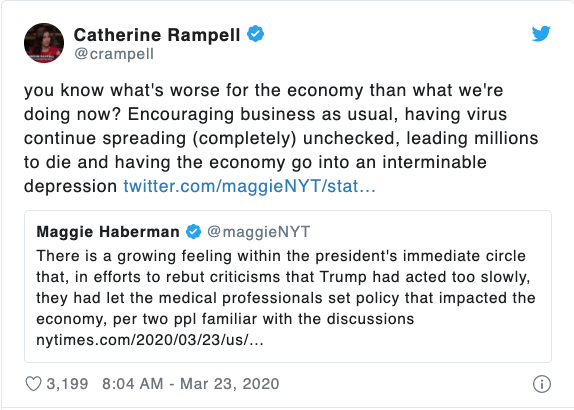Wednesday in Whitewater will be partly sunny with a high of fifty-six. Sunrise is 6:46 AM and sunset 7:14 PM, for 12h 27m 43s of daytime. The moon is a waxing crescent with 1.1% of its visible disk illuminated.
On this day in 1655, Huygens discovers Saturn’s largest moon, Titan.
Recommended for reading in full —
David E. Sanger, Zolan Kanno-Youngs, and Ana Swanson report Slow Response to the Coronavirus Measured in Lost Opportunity:
When Ford’s chief executive, Jim Hackett, announced on Tuesday that the carmaker would team up with General Electric to build ventilators, he tempered the good news with a note of caution: “We’re talking about early June.”
That was just one of several examples that underscored the price of the Trump administration’s slow response to evidence as early as January that the coronavirus was headed to the United States.
For the first time, it is now possible to quantify the cost of the lost weeks, as President Trump was claiming as recently as February that in a “couple of days” the number of cases in the United States “is going to be down to close to zero.”
Ford’s timeline suggested that if the administration had reacted to the acute shortage of ventilators in February, the joint effort between Ford and General Electric might have produced lifesaving equipment sometime in mid- to late April.
Tory Newmyer writes Wall Street to Trump: Don’t restart economy before stopping coronavirus spread:
President Trump is considering whether to bring the economy out of its government-induced coma in the next week or two, insisting the pain of the restrictions should not outweigh that from the coronavirus itself.
But investors, portfolio managers and economists with a front-row seat to the ongoing carnage on Wall Street and beyond aren’t so sure that scaling back social distancing is the right move. Many say the economy — and still-sliding stock market along with it — won’t begin to recover until the United States definitively turns the tide against the disease.
“You may get a [market] bounce on the headline,” Quincy Krosby, chief market strategist at Prudential Financial Inc., tells me…Above all else it will be the empirical data that suggests the virus is receding.”
(Emphasis in original.)
David A. Fahrenthold, Joshua Partlow, and Jonathan O’Connell report Before Trump called for reevaluating lockdowns, they [states’ orders] shuttered six of his top-earning clubs and resorts:
President Trump’s private business has shut down six of its top seven revenue-producing clubs and hotels because of restrictions meant to slow the spread of the novel coronavirus, potentially depriving Trump’s company of millions of dollars in revenue.
Those closures come as Trump is considering easing restrictions on movement sooner than federal public health experts recommend, in the name of reducing the virus’s economic damage.
In a tweet late Sunday, Trump said the measures could be lifted as soon as March 30. “WE CANNOT LET THE CURE BE WORSE THAN THE PROBLEM ITSELF,” he wrote on Twitter.
….
Three of Trump’s hotels — in Doral, Chicago and Washington — have outstanding loans from Deutsche Bank that originally totaled more than $300 million. Even before the coronavirus outbreak, all three reported lagging behind their peers in occupancy and revenue, struggles that the company’s representatives blamed, in one way or another, on Trump’s political rise.
(Emphasis added.)



